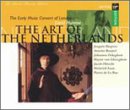| All Artists: Josquin Desprez, Heinrich Isaac, Hayne van Ghizeghem, Antoine Brumel, Johannes Ghiselin, Jacques Barbireau, Johannes Ockeghem, Antoine Busnois, Johannes Tinctoris, David Munrow Title: The Art of the Netherlands (2 CD Set) - The Early Music Consort of London, David Munrow Members Wishing: 1 Total Copies: 0 Label: Virgin Records Us Original Release Date: 1/1/2005 Re-Release Date: 11/11/1997 Genres: Special Interest, Pop, Classical Styles: Vocal Pop, Opera & Classical Vocal, Historical Periods, Early Music Number of Discs: 2 SwapaCD Credits: 2 UPC: 724356133426 |
Search - Josquin Desprez, Heinrich Isaac, Hayne van Ghizeghem :: The Art of the Netherlands (2 CD Set) - The Early Music Consort of London, David Munrow
 | Josquin Desprez, Heinrich Isaac, Hayne van Ghizeghem The Art of the Netherlands (2 CD Set) - The Early Music Consort of London, David Munrow Genres: Special Interest, Pop, Classical
|
Larger Image |
CD Details |
CD ReviewsHolds Its Own After Three Decades Leslie Richford | Selsingen, Lower Saxony | 05/08/2005 (5 out of 5 stars) "Virgin?s David Munrow Edition was issued to commemorate the twentieth anniversary of the unfortunate passing of this amazing man who influenced the British early music scene at the beginning of the seventies like no other ? as musicologist, music journalist, musical instrument collector and, of course, as performer. ?The Art of the Netherlands? was originally a 3-LP collection, one of the last that Munrow made, having been recorded in London?s Abbey Road studios in February and April 1975. As might be expected from such a collection, it offers an overview of the creative efforts of the Dutch-Flemish school of composition between approx. 1450 and 1550. The first of the two CDs is devoted entirely to secular songs by Josquin Desprez, Heinrich Isaac, Hayne van Ghizeghem (with arrangements by Alexander Agricola), Antoine Brumel, Johannes Ghiselin, Jacob Obrecht, Johannes Ockeghem and Antoine Busnois ? most of these names will be familiar to those who love the choral music of this age, but of the songs here presented, only a few are commonly performed. Munrow?s performance practice, using countertenors and a whole array of mediaeval and renaissance instruments as accompaniment, could raise an eyebrow today, a more puristic approach being generally preferred, but the result is definitely worth hearing, with some excellent singing by James Bowman and a team of up to fourteen singers. The sound quality is excellent, although the stereo panorama does not appear to be as broad as on some other Munrow discs.
The second of the two CDs is divided between a composite mass that Munrow has put together from movements by Johannes Tinctoris, Brumel, Josquin, Pierre de la Rue and Isaac, and a series of sacred and Marian motets by Obrecht, Compère, Josquin, Jean Mouton, Ockeghem, Obrecht and La Rue (with alternative ascriptions in some cases and complemented by the usual anonymi). This second disc is strictly vocal without instrumental accompaniment, something that is not only historically accurate but also makes for absolute clarity in listening. Munrow?s choir is made up of men only except on one single track where he uses two sopranos; the voices are superb and enable one to revel in this delightful music. The way bass Terry Edwards maintains the deep tessitura in some of the motets is, I find, particularly impressive. Of course, there are plenty of recordings around today (in the meantime 30 years have passed) with this kind of music sung by mixed choirs (Tallis Scholars, the Sixteen) in impeccable performances, but Munrow and his all-male team are still able to hold their own after all these years. " |

 Track Listings (23) - Disc #1
Track Listings (23) - Disc #1